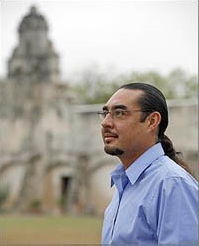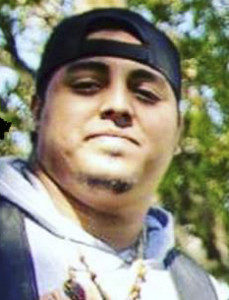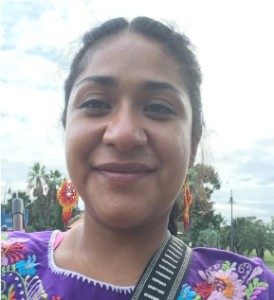

Ramon Vasquez, Executive Director
Born in San Antonio and later moved to Milwaukee, Wisconsin where he worked as a gang specialist for Centro De La Comunidad Unida, a position he dedicated himself to for five years. During his tenure at Centro, he specialized in the development and implementation of intervention projects amongst Latino Street gangs. In 1991, he and his family moved back to San Antonio and he joined the Good Samaritan Center as Program Director for the Youth in Conflict Gang Program. Ramon was instrumental in the establishment of a 5 year Peace Truce between 6 of San Antonio’s most notorious street gangs. In 1998, he was appointed and currently serves as Executive Director of the American Indians in Texas at the Spanish Colonial Missions. Ramon has spent the last 6 years specifically working on community mobilization and Community/Academic partnerships. Primarily focusing on the mobilization of men in the areas of domestic violence, promoting positive images on fatherhood, and confronting male stereotypes and falsehoods. He is the Co-Founder and Vice President of the Land Heritage Institute Foundation, Co-Founder of the American Indians in Texas Institute, and Co-Founder of the National Urban Indian Family Coalition.
 Greg Marshall, Program Director
Greg Marshall, Program Director
Greg Marshall is a single father of three wonderful kids. He has the honor of being a full-time dad. With the flexibility of the Fatherhood Campaign, he has the ability to see his kids off to school and pick them up as they are getting off the bus. His involvement with the Campaign has helped him be the very best father he can be, daily improving his proficiency, giving him the education, experience, and skills to guide, honor and parent his children as they become young adults. Greg has been a key member of the San Antonio Fatherhood Campaign since 2012.
Greg was born, raised, and educated in the state of Michigan. His father was happy, go luck alcoholic who quit drinking when Greg was 15. His father was a very active member of his twelve-step community, maintaining his sobriety until the day he died, (+) twenty years later. Showing & teaching Greg that it was never too late to change, never too late to heal, never too late. Greg’s mother suffered from rheumatoid arthritis, vasculitis, and lupus. Much like many of the Fatherhood Campaign dads, he didn’t have the best parental role models. Yes, his parents loved him. But, that didn’t give him the skills to be a good father. The Fatherhood Campaign was there to help him, so in turn, he is dedicated to raising his children and helping the Fatherhood clients raise theirs.
Spending almost 20 years in corporate America, working for the automobile industry, corporate wellness, and in a consultant firm, Greg believes that it is not for our government, or even non-profits, to heal our community. That it is for us, the people, to heal our community; heal our men & women; heal our children. Part of this healing process is sharing our stories with our children, becoming our children’s storytellers.
Greg enjoys hearing people stories, please visit with him and tell him your story.
 Ramon D. Vasquez, Male Development Coordinator
Ramon D. Vasquez, Male Development Coordinator
A tribal member of the Tap Pilam Coahuiltecan Nation, husband, and father, Ramon has been with the organization since 2010 and serves as a facilitator for the Rights of Passage program and Circulo de Hombres. Ramon specializes in Character Development work with at-risk teenagers, predominately in San Antonio’s West, South, and Eastside. He also works with Native American youth throughout the city to advocate and promote an understanding of Cultural Identity/ Awareness through Cultural Arts and Education.
 Luissana Santibanez, Program Coordinator
Luissana Santibanez, Program Coordinator
Luissana Santibañez is a proud mother of two and a member of the Purépecha Nation. Luissana currently serves as an educator & community health worker for American Indians in Texas, coordinating the San Antonio Fatherhood Campaign program, facilitating the Joven Noble Rights of Passage program for youth involved in the Bexar County Juvenile System.